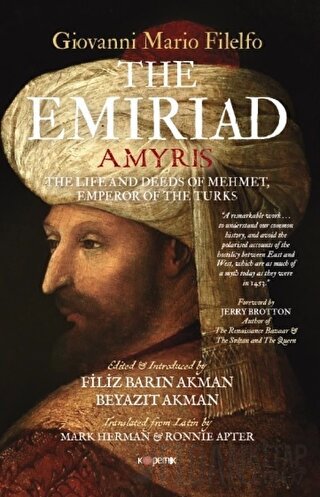
The year was 1453. Soon after he had conquered Constantinople, an event that would change the entire history of the East and West, the determined young Turkish Sultan/Emir Mehmet II, only 21 years old, victoriously entered the city. Among the captives was a Latin named Angelo Boldoni, Ambassador of Ancona, Italy. However, as soon as Mehmet learned that Boldoni was a relative of Othman Lillo Ferducci, the son of his father Murat II's close friend, Boldoni was released without ransom. Othman Ferducci's gratitude for Mehmet's generous gesture was expressed years later by his commissioning (and writing a Dedication to) an epic poem in praise of Mehmet’s conquests and adventures, an epic in the tradition of the Aeneid, Iliad, and Odyssey. The commission was given to the poet Gian Mario Filelfo, biographer of Dante and son of one of the leading humanists of the Renaissance, Francesco Filelfo. And so Amyris, a poem of about five thousand lines, was completed in Italy in 1476.
Amyris has remained in obscurity as a single manuscript copy, virtually a banned book, for centuries, perhaps because, unlike most other Western writings during the Renaissance, it is not wholly derogatory toward a Turkish and Muslim Sultan. Now, approximately 550 years after the poem’s composition, Associate Professors Filiz Barın Akman and Beyazıt Akman publish annotated Turkish and English translations of the poem, together with comprehensive introductory chapters offering historical information, textual analysis, commentary and criticism. The Akmans are experts about the image of the Turks and Islam in Western literature and historiography. The translation from Latin into English poetry is by Mark Herman and Professor Emerita Ronnie Apter and the Turkish translation is by Ahmet Deniz Altunbaş.
The year was 1453. Soon after he had conquered Constantinople, an event that would change the entire history of the East and West, the determined young Turkish Sultan/Emir Mehmet II, only 21 years old, victoriously entered the city. Among the captives was a Latin named Angelo Boldoni, Ambassador of Ancona, Italy. However, as soon as Mehmet learned that Boldoni was a relative of Othman Lillo Ferducci, the son of his father Murat II's close friend, Boldoni was released without ransom. Othman Ferducci's gratitude for Mehmet's generous gesture was expressed years later by his commissioning (and writing a Dedication to) an epic poem in praise of Mehmet’s conquests and adventures, an epic in the tradition of the Aeneid, Iliad, and Odyssey. The commission was given to the poet Gian Mario Filelfo, biographer of Dante and son of one of the leading humanists of the Renaissance, Francesco Filelfo. And so Amyris, a poem of about five thousand lines, was completed in Italy in 1476.
Amyris has remained in obscurity as a single manuscript copy, virtually a banned book, for centuries, perhaps because, unlike most other Western writings during the Renaissance, it is not wholly derogatory toward a Turkish and Muslim Sultan. Now, approximately 550 years after the poem’s composition, Associate Professors Filiz Barın Akman and Beyazıt Akman publish annotated Turkish and English translations of the poem, together with comprehensive introductory chapters offering historical information, textual analysis, commentary and criticism. The Akmans are experts about the image of the Turks and Islam in Western literature and historiography. The translation from Latin into English poetry is by Mark Herman and Professor Emerita Ronnie Apter and the Turkish translation is by Ahmet Deniz Altunbaş.











